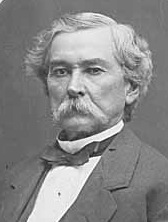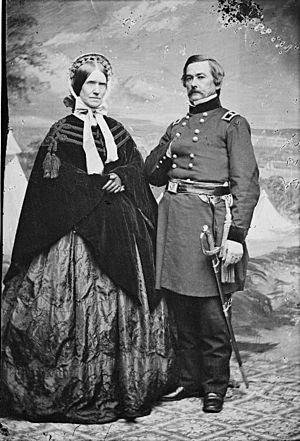Willis A. Gorman facts for kids
Quick facts for kids
Willis A. Gorman
|
|
|---|---|

Willis A. Gorman, 1872
|
|
| 2nd Territorial Governor of Minnesota | |
| In office May 15, 1853 – April 23, 1857 |
|
| Appointed by | Franklin Pierce |
| Preceded by | Alexander Ramsey |
| Succeeded by | Samuel Medary |
| Member of the U.S. House of Representatives from Indiana's 6th district |
|
| In office March 4, 1849 – March 3, 1853 |
|
| Preceded by | George G. Dunn |
| Succeeded by | Thomas A. Hendricks |
| Member of the Indiana House of Representatives | |
| In office 1841–1844 |
|
| Personal details | |
| Born |
Willis Arnold Gorman
January 12, 1816 Flemingsburg, Kentucky, U.S. |
| Died | May 20, 1876 (aged 60) Saint Paul, Minnesota, U.S. |
| Political party | Democratic |
| Spouse | Martha Stone |
| Profession | lawyer and politician |
| Military service | |
| Allegiance | United States |
| Branch/service | United States Army Union Army |
| Years of service | 1846–1848 1861–1864 |
| Rank | |
| Unit | 3rd Indiana Volunteers |
| Commands | 4th Indiana Volunteers 1st Minnesota Infantry 1st Bde, 2nd Div, II Corps |
| Battles/wars | Mexican–American War American Civil War |
Willis Arnold Gorman (born January 12, 1816 – died May 20, 1876) was an important American figure. He was a skilled lawyer and politician. He also served as a brave soldier and a general in the Union Army during the American Civil War.
Contents
Early Life and Career
Willis Gorman was born in 1816 near Flemingsburg, Kentucky. He was the only child of David and Elizabeth Gorman. In 1835, his family moved to Bloomington, Indiana.
He attended Indiana University and later became a lawyer. In 1836, he married Martha Stone in Bloomington. He started his political career in 1837. He worked as a clerk in the Indiana State Senate. From 1841 to 1844, he was elected to the Indiana House of Representatives.
Service in the Mexican-American War
In 1846, Willis Gorman joined the army as a private. He fought in the Mexican–American War. He quickly rose through the ranks. He became a major in the 3rd Indiana Volunteer Infantry. He led a group of riflemen at the Battle of Buena Vista. He was seriously injured during this battle.
After his first service ended, he joined again. He was made a colonel of the 4th Indiana. He fought in the capture of Huamantla and other battles. In 1848, he was in charge of the city of Puebla. Soon after, he returned to Indiana.
Entering National Politics
From 1849 to 1853, Gorman served in the United States House of Representatives. He represented the state of Indiana.
Governor of Minnesota Territory
Willis Gorman was a member of the Democratic Party. He became the second Governor of the Minnesota Territory. President Franklin Pierce appointed him. He served from May 15, 1853, to April 23, 1857.
During his time as governor, he had a plan. He wanted to move the capital of the territory. He aimed to move it from St. Paul to St. Peter. He owned land in St. Peter that would have been perfect for the new capital. However, his plan did not work out. A lawmaker named Joe Rolette stopped the bill. He disappeared with it until the very end of the legislative session.
After his time as governor, he continued his law practice. He worked in St. Paul, Minnesota. He also served in the Minnesota House of Representatives. He was a member from May 1858 to January 1859.
American Civil War Service
When several Southern states left the United States, Gorman offered to serve in the army again. He was appointed Colonel of the 1st Minnesota Infantry. He fought in the First Battle of Bull Run in July 1861.
In September 1861, he was promoted. He became a brigadier general of volunteers. He was put in command of a group of soldiers. They were part of the II Corps in the Army of the Potomac. He led them during the Peninsular Campaign. His troops faced many challenges. They suffered many losses at the Battle of Antietam. This was during an attack on enemy positions. Later that year, he was put in charge of the District of Eastern Arkansas.
Later Life
In 1864, Willis Gorman left the army. He went back to being a lawyer in St. Paul. In 1869, he was elected City Attorney. He held this position until he passed away. He is buried in Oakland Cemetery in St. Paul.


